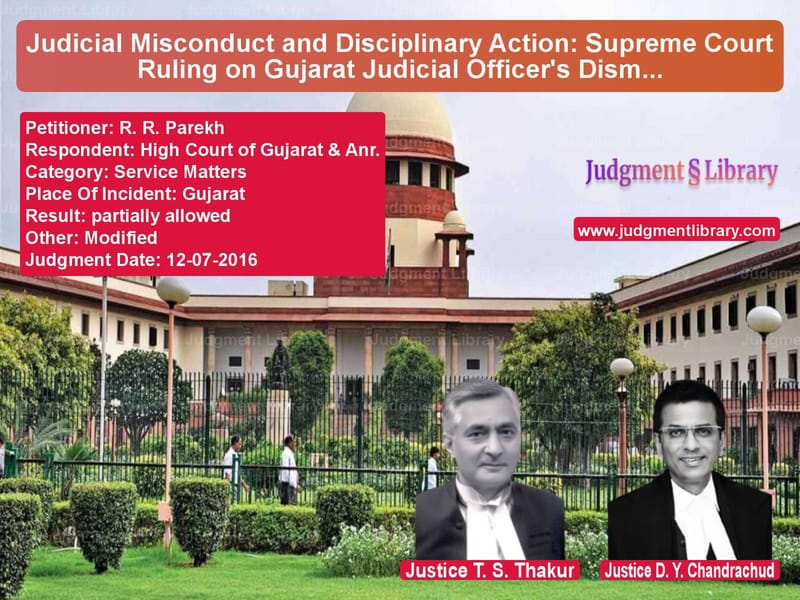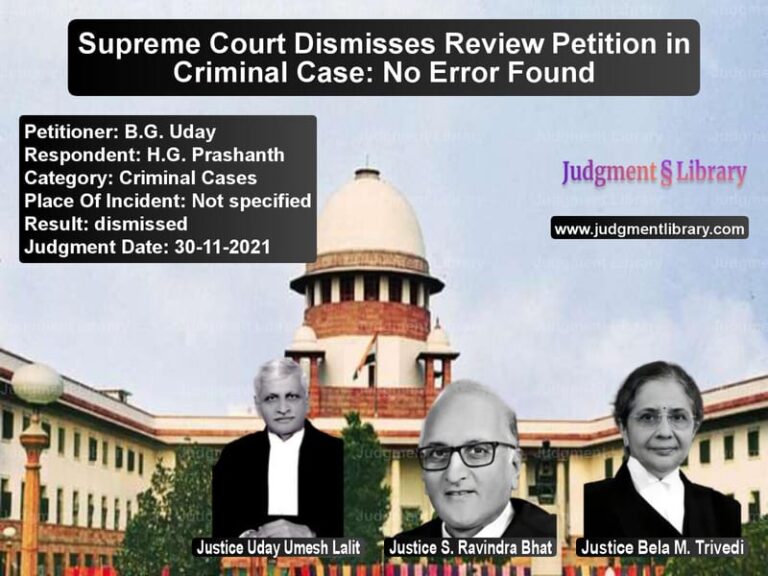Judicial Misconduct and Disciplinary Action: Supreme Court Ruling on Gujarat Judicial Officer’s Dismissal
The case of R. R. Parekh vs. High Court of Gujarat & Anr. highlights significant concerns regarding judicial misconduct and the disciplinary actions that follow. This case, which reached the Supreme Court, questioned the dismissal of a judicial officer by the Gujarat High Court based on disciplinary proceedings that found him guilty of misconduct. The Supreme Court examined whether the punishment was proportionate and whether due process was followed in reaching the decision.
Background of the Case
R. R. Parekh, a judicial officer in Gujarat, was dismissed from service after being found guilty of misconduct in a disciplinary inquiry. The charges against him stemmed from his actions as Chief Judicial Magistrate (CJM) in Bhuj, where he handled cases related to smuggling under the Customs Act, 1962. His judgments in these cases became the subject of departmental scrutiny when he awarded sentences below the statutory minimum, allegedly favoring the accused.
The High Court of Gujarat found that the disciplinary proceedings had established serious charges against him, including granting lenient sentences without proper justification. The decision led to his dismissal from service, which he challenged before the Supreme Court.
Key Legal Issues Considered
- Did the disciplinary inquiry against R. R. Parekh follow due process?
- Was the punishment of dismissal proportionate to the misconduct proven?
- Should a judicial officer’s decision in a case be grounds for disciplinary action?
- Did the High Court exceed its jurisdiction in imposing such a severe penalty?
Arguments from Both Sides
Appellant’s Arguments
R. R. Parekh, in his defense, contended:
- “The disciplinary inquiry was flawed and lacked sufficient evidence to prove misconduct.”
- “The sentencing decisions were judicial actions and should not form the basis for disciplinary proceedings.”
- “There was no corrupt intent or personal benefit derived from the judgments.”
- “The dismissal from service was excessive and disproportionate to the alleged misconduct.”
Respondents’ Arguments
The Gujarat High Court and the disciplinary authorities argued:
- “The judicial officer had violated mandatory sentencing provisions under Section 135 of the Customs Act.”
- “By awarding sentences below the statutory minimum, he had acted against established legal principles.”
- “The accused in smuggling cases were granted set-offs in such a way that they did not serve any additional imprisonment.”
- “Such actions undermine public trust in the judiciary and warrant serious disciplinary action.”
Supreme Court’s Judgment
The Supreme Court ruled:
- “The judicial officer’s actions in reducing the sentences in smuggling cases without proper justification amount to misconduct.”
- “However, there is no direct evidence of corruption, and the punishment of dismissal is excessive.”
- “The penalty of dismissal is modified to compulsory retirement, allowing the appellant to receive retirement benefits.”
Detailed Analysis of the Judgment
The Supreme Court observed that judicial decisions, even if erroneous, should not automatically be treated as misconduct unless there is clear evidence of extraneous influence or improper intent. However, in this case, the following factors contributed to the finding of misconduct:
- The judicial officer ignored the mandatory provisions of the Customs Act.
- The sentencing pattern suggested deliberate leniency towards the accused.
- The reasoning provided for reduced sentences was legally unsound.
- The conduct raised questions about the officer’s integrity and impartiality.
The Court balanced the need for judicial independence with accountability, stating:
“The threat of disciplinary proceedings must not demotivate the honest and independent officer. Yet, there is a vital element of accountability in dealing with cases of misconduct.”
Impact of the Judgment
The ruling has significant implications:
- It reinforces that judicial officers must adhere to statutory sentencing guidelines.
- It establishes that while judicial decisions can be reviewed in disciplinary proceedings, dismissal should be reserved for cases with clear corrupt motives.
- It underscores the importance of maintaining public confidence in the judiciary.
- It provides a balanced approach to judicial accountability, preventing misuse of disciplinary proceedings while ensuring judges do not act arbitrarily.
Conclusion
The Supreme Court’s decision to convert dismissal into compulsory retirement reflects a nuanced approach to judicial accountability. While protecting judicial independence, it ensures that gross negligence in judicial duties does not go unchecked. This case serves as a precedent for handling similar cases involving judicial misconduct, striking a balance between ensuring fairness and upholding judicial integrity.
Don’t miss out on the full details! Download the complete judgment in PDF format below and gain valuable insights instantly!
Download Judgment: R. R. Parekh vs High Court of Gujara Supreme Court of India Judgment Dated 12-07-2016-1741873185502.pdf
Direct Downlaod Judgment: Direct downlaod this Judgment
See all petitions in Disciplinary Proceedings
See all petitions in Termination Cases
See all petitions in Judgment by T.S. Thakur
See all petitions in Judgment by Dhananjaya Y Chandrachud
See all petitions in partially allowed
See all petitions in Modified
See all petitions in supreme court of India judgments July 2016
See all petitions in 2016 judgments
See all posts in Service Matters Category
See all allowed petitions in Service Matters Category
See all Dismissed petitions in Service Matters Category
See all partially allowed petitions in Service Matters Category







